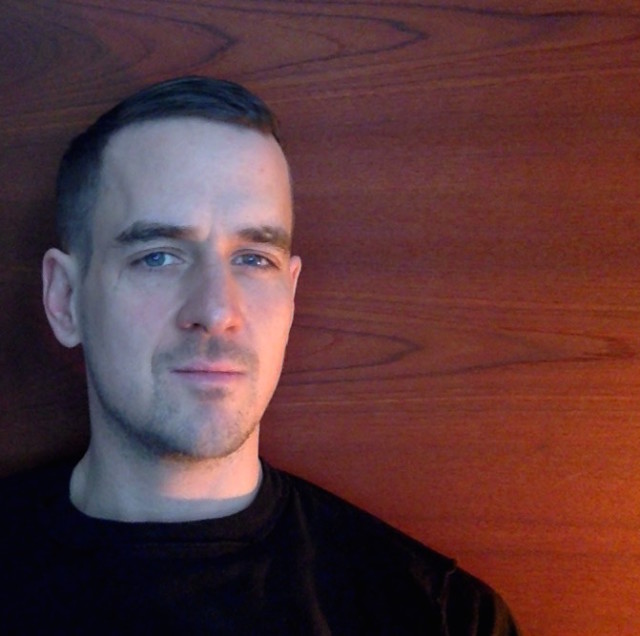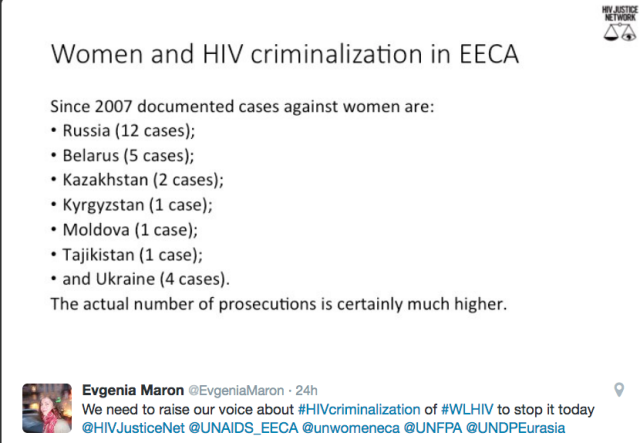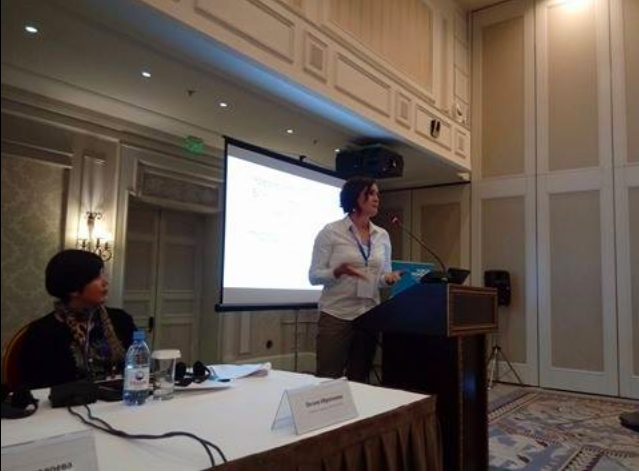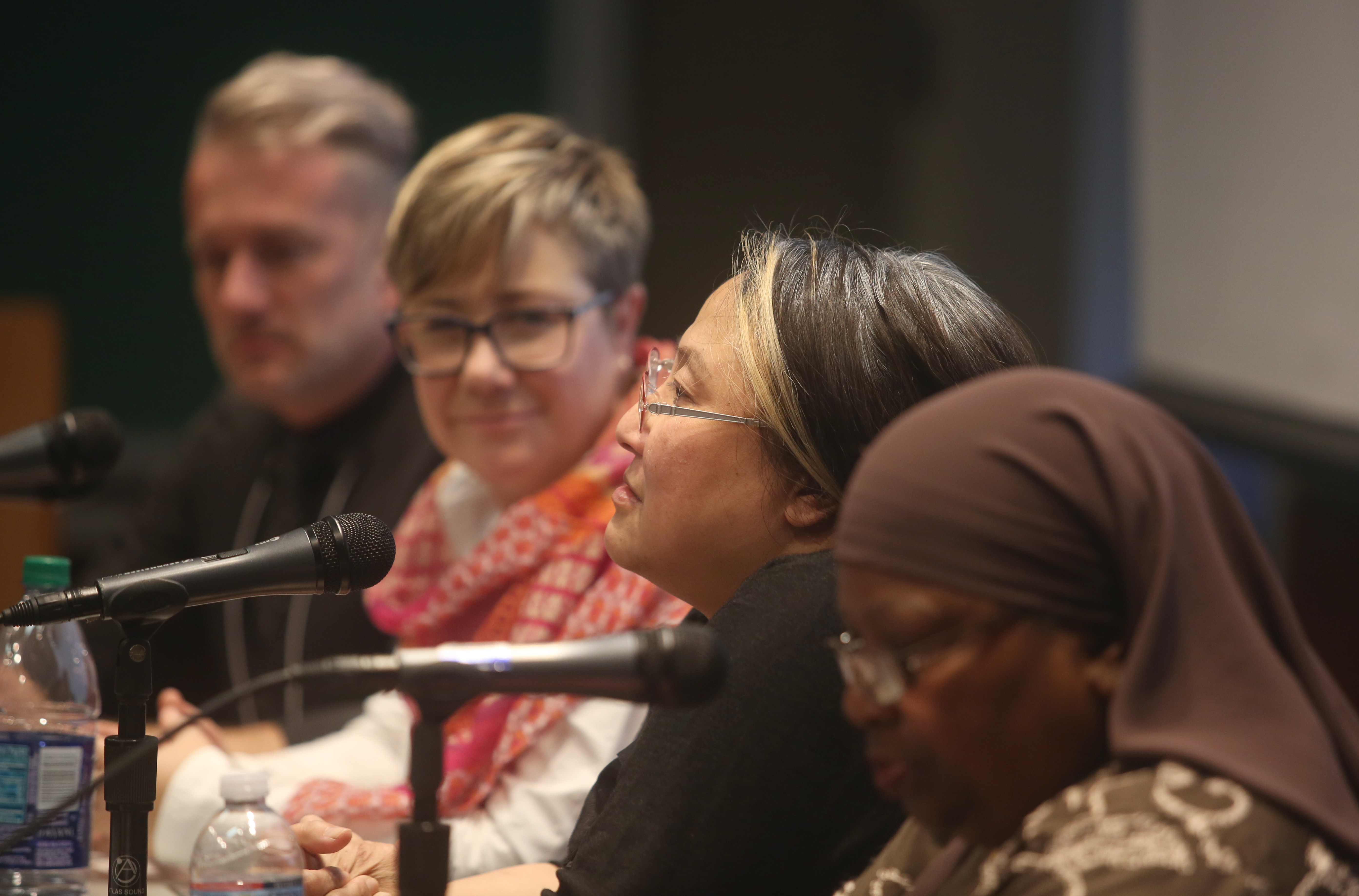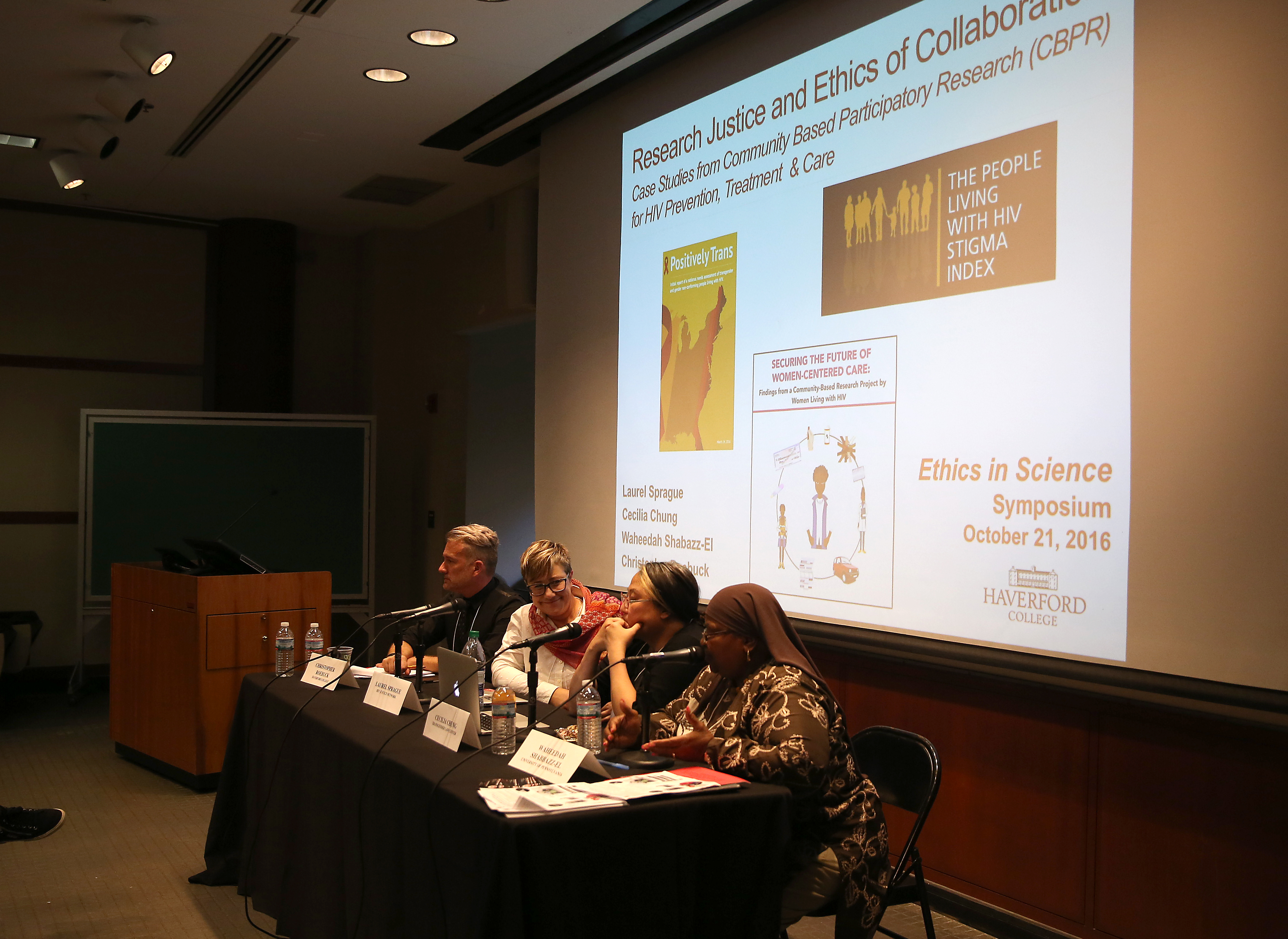Русский текст читайте, пожалуйста, ниже
Today, Sunday, October 23, 2016, Positive Women’s Network – USA observes the third National Day of Action to End Violence Against Women Living with HIV.
This is an event to create awareness about the levels of violence faced by women living with HIV, and to mobilise action to end that violence. As PWN-USA Executive Director, Naina Khanna, describes it: for women, violence is both a cause and a consequence of living with HIV.
The 2016 Day of Action takes as its focus a pernicious form of violence: the criminalisation of women living with HIV.
From the other side of Atlantic Ocean, in Eastern Europe and Central Asia, raising attention to HIV criminalisation as a form of violence against women living with HIV presents a new angle from which to examine how both of these phenomena are understood. Let us consider this intersection, where HIV-related stigma, HIV criminalisation and gender inequality place women at greater risk of violence, maltreatment and injustice.
To date, the HIV Justice Network has documented prosecutions of women under HIV-specific laws criminalising alleged HIV non-disclosure, potential or perceived exposure, and non-intentional transmission in Russia (12 cases); Belarus (5 cases); Kazakhstan (2 cases); Kyrgyzstan (1 case); Moldova (1 case); Tajikistan (1 case); and Ukraine (4 cases). The actual number of prosecutions is certainly much higher.
Let’s take a closer look at Russia’s 12 cases against women living with HIV. In Russia, alleged HIV non-disclosure, potential or perceived exposure, and non-intentional transmission are penalized by up to a maximum of eight years in jail.
Examining the media coverage, none of these women had an opportunity to speak for herself publicly, and at least half of them were subjected to public ‘slut shaming’ in the media because it was alleged they had multiple intimate partners.
The other half of the women were prosecuted by their intimate male partners. The language of the publications depicts the women as irresponsible and unaccountable subjects, highlights their neglect of barrier contraception measures and of their responsibility to disclose, and characterises the women as the ‘source of HIV transmission’. Although it seems that the media were trying to be sympathetic toward these women, the media authors fail to excite pity with stories by adding details about their poor state of health, bearing children a young age, and/or that they pleaded guilty.
Stigma and discrimination, particularly where women’s moral conduct is judged, play a major role in the severe social and physical consequences that women suspected of being HIV-positive can face, impacting media, the legal system and community.
HIV-related stigma and discrimination switches the media’s focus away from the perpetrators of sexual violence and their punishment to speculations about the culpability of a woman-survivor.
HIV-related stigma and discrimination creates HIV-specific laws based on the assumption that women living with HIV are potential perpetrators in need of state control.
HIV-related stigma and discrimination impacts how communities see women living with HIV, potentially legitimizing even murder. This is especially relevant to religious and traditional communities, where the whole family may feel shamed because of the HIV-status of a female family member, and may fuel higher levels of domestic violence, but it goes beyond this.
In Russia, with its 400,000 women who have tested HIV-positive, the fear of partner violence persists as a daily reality. NGOs assess the number of sexual assaults and gender-based violence crimes against women- as 30,000 – 50,000 per year with only 10% of them reported to the police. In the Russian People Living with HIV Stigma Index study, one-fifth of the people with HIV who faced violence said it was perpetrated by their partner.
Indeed, starting from 2007, we have documented at least eight cases of brutal killings of women who either disclosed their HIV-positive status to their partners or were alleged by the killers or police to be HIV-positive. Thus, non-disclosure might be a coping strategy that women develop to try to survive against violence at home, while simultaneously risking prosecution as criminals because of the criminalisation of HIV non-disclosure.
Similarly, in Belarus, the five women who were prosecuted under HIV criminal laws were characterised in the media as frivolous women of easy virtue, alcohol abusers, and unable to take measures to prevent HIV transmission. Given that two of them were prosecuted for potential or perceived HIV exposure, although no transmission occurred, it is important to see how the prosecution started: the women informed their lovers of their HIV status after the sexual activity. In all media reports and comments by the prosecutor’s office, the women were depicted as those actively taking steps to transmit HIV to others; all are described in an active voice as criminals. In Belarus, law enforcement registers a low number of cases of violence against women along with high rates of women dying from violence at home, women with HIV were much more likely to report being physically abused by their spouses and partners.
In Ukraine, at least four women were prosecuted both for HIV transmission to their intimate partners or to both to their partners and their children, and for HIV exposure. There has been a glimmer of hope and reason from Ukraine, however, which might represent a less punitive turn since 2011.
We recently received information about a case in which a woman, accused of alleged non-disclosure, was acquitted. The court argued that “the relations that developed between the partners in their nature was about HIV exposure. Firstly, the crime didn’t constitute the HIV exposure, but only actions that could have been considered as exposure. Second, the pre-trial investigation and the prosecutor falsely assigned responsibility for creating such a threat of exposure to the accused.”
Further, the verdict found that the guilt of the sexual partner of the HIV-positive defendant in creating the threat of HIV exposure was greater than the guilt of the defendant, given that he was 16 years older than her, had more experience, including in relationships with women and had children from different women, and was characterized as having a promiscuous sexual behaviour. Overall, in Ukraine, the courts tended to respond to HIV criminalisation cases against women by reducing the penalty from time in prison to a suspended sentence.
In Kazakhstan, a woman living with HIV from Karaganda, was taken by the police to the AIDS Center to force her to take antiretroviral medication during her pregnancy. The media response discussed only the public health perspective, making the woman appear irrational and uncaring toward her baby. The media said nothing about the reasons why the woman was avoiding treatment, failed to give her a voice, and provided no information about whether social and psychological services were offered to her prior to police involvement.
Further, as documented by us, women in Kazakhstan, Kyrgyzstan and Tajikistan who are marginalized because they do sex work, have been disproportionately targeted by police, and found themselves subjected to forced HIV testing.
The criminalisation of sex work along with public characterisations of sex workers as ‘latent reservoirs for HIV’, sets sex workers up for police harassment, arrest, and unwarranted seizures in the name of public health.
In Kazakhstan, Almaty police identified 98 sex workers as HIV-positive and conducted a search for their clients. However, it remains unknown if the search brought further charges.
In Kyrgyzstan, the practice of illegal HIV testing in association with police raids on sex workers persists. Law enforcement personnel, in order to provide for the formal requirements of the law, summon AIDS center staff members, who obtain written consent to HIV testing under conditions of arbitrary detention. There are also known cases where the police detained sex workers and illegally sent them for forced medical testing, including for STIs and HIV.
Similarly, in Tajikistan, 505 sex workers were detained and forced to undergo HIV and STI testing. Community organizations report that often the test results are disclosed in front of other detainees and police staff.
One way or another, all of these can be also framed in terms of structural or cultural violence, in which social structures are used to justify direct violence or situations that drastically increase the vulnerability of women living with HIV to violence.
In the cases that we know, HIV-related stigma and HIV criminalisation evolve to a form of cultural violence that makes the communities and media audiences feel ‘right’ about blaming the women with HIV who experience an HIV-related prosecution, making this acceptable in our societies.
There is no doubt that gender shapes HIV disclosure motivations and reactions. Disclosure is not a gender-neutral event because women face the possibility of increased violence afterwards. It is an impossible choice: choosing between the immediate need to protect themselves from partner violence, or a risk that they can go to prison for alleged HIV non-disclosure, exposure, or transmission.
No matter where it occurs, it is time to claim justice for women living with HIV.
Evgenia Maron is the HIV Justice Network’s EECA Consultant
The HIV Justice Network is a founding partner of HIV Justice Worldwide, together with the Positive Women’s Network-USA, AIDS Rights Alliance of Southern Africa (ARASA), the Sero Project, the Canadian HIV/AIDS Legal Network, Global Network of People Living with HIV (GNP+), and the International Community of Women Living with HIV (ICW). More information about HIV Justice WorldWide is available here.
Сегодня, в воскресенье, 23 октября 2016 года, “Сеть позитивных женщин – США” объявила третий Национальный день действий для прекращения насилия против женщин, живущих с ВИЧ.
Этот день предназначен для повышения осведомленности о насилии, с которыми сталкиваются женщины, живущие с ВИЧ, а также для мобилизации и действий по прекращению насилия. Как отмечает исполнительный директор PWN-США, Наина Кханна: “Для женщин, насилие является как причиной, так и следствием жизни с ВИЧ”.
В 2016 году темой дня выбрана губительная форма насилия – криминализация женщин, живущих с ВИЧ.
По другую сторону Атлантического океана, в Восточной Европе и Центральной Азии, повышение внимания к проблеме криминализации ВИЧ как одной из форм насилия против женщин, живущих с ВИЧ, представляет собой новый взгляд на исследования, обсловленный тем, как понимаются оба эти явления. Рассмотрим это пересечение, где стигма в связи с ВИЧ, криминализация ВИЧ и гендерное неравенство помещают женщину в ситуацию наибольшего риска насилия, жестокого обращения и несправедливости.
На сегодняшний день Сеть “Правосудие и ВИЧ” задокуменитировала случаи судебного преследования женщин в рамках ВИЧ-специфических законов, вводящих уголовную ответственность за предполагаемое неразглашение ВИЧ-статуса, потенциальную или воспринимаемую постановку в опасность заражения и ненамеренную передачу в России (12 случаев); Беларуси (5 случаев); Казахстане (2 случая); Кыргызстане (1 случай); Молдове (1 случай); Таджикистане (1 случай); и в Украине (4 случая). Фактическое число судебных дел, несомненно, гораздо выше.
Давайте подробнее рассмотрим 12 российских случаев преследования женщин, живущих с ВИЧ. В России предполагаемое нераскрытие ВИЧ-статуса, потенциальная или воспринимаемая постановка в опасность заражения и ненамеренная передача ВИЧ наказываются максимальным сроком до восьми лет в тюрьме.
В результате изучения публикации в СМИ можно сделать вывод, что ни одна из этих женщин не имела возможность говорить за себя публично, и, по крайней мере, половина из них были подвергнуты публичному «слатшеймингу» в СМИ, так как утверждалось, что они имели несколько интимных партнеров.
Другая половина женщин была привлечена к ответственности своими интимными партнерами-мужчинами. Язык публикаций изображает этих женщин как безответственных и немотивированных субъектов, подчеркивает их пренебрежение барьерными мерами контрацепции и своей ответственностью за раскрытие диагноза, и характеризует этих женщин как «источник передачи ВИЧ-инфекции». Хотя кажется, что СМИ пытаются вызвать симпатию к этим женщинам, авторам не удается пробудить жалость рассказами об их плохом состоянии здоровья, рождении детей в молодом возрасте, и / или тем, что они признали свою вину.
Стигма и дискриминация, особенно если судят безнравственное поведение женщин, играют важную роль в тяжелых социальных и физических последствиях, с которыми могут столкнуться женщины, подозреваемые в том, что они ВИЧ-инфицированы, оказывают влияние на мнение СМИ, правовой системы и общества.
Стигма и дискриминации в связи с ВИЧ переключают внимание СМИ от лиц, совершивших сексуальное насилие, и их наказания к спекуляциям о виновности женщины, пережившей насилие.
Стигма и дискриминация в связи с ВИЧ создают определенные законы, основанные на предположении, что женщины, живущие с ВИЧ, являются потенциальными злоумышленниками, над которыми необходим государственный контроль.
Стигма и дискриминация в связи с ВИЧ влияют на то, как общество смотрит на женщин, живущих с ВИЧ, потенциально оправдывая даже убийство. Это особенно актуально для религиозных и традиционных общин, где вся семья может быть опозорена из-за ВИЧ-статуса члена семьи женского пола, а также может повысить уровень насилия в семье, и даже больше.
В России для 400 000 женщин, которые оказались ВИЧ-инфицированными, страх насилия со стороны партнера стал повседневной реальностью. НПО оценивают число сексуальных нападений и гендерных преступлений, связанных с насилием в отношении женщин, в 30 000 – 50 000 ежегодно, и только о 10% из них сообщают в полицию. В исследовании “Индекс стигмы” среди российских людей, живущих с ВИЧ, одна пятая часть людей, живущих с ВИЧ, которые столкнулись с насилием, отметили, что оно было совершено их партнером.
Действительно, начиная с 2007 года, мы задокументировали по меньшей мере восемь случаев жестоких убийств женщин, которые либо сообщили о своем ВИЧ-позитивном статусе своим партнерам или якобы обладали ВИЧ-положительным статусом по мнению убийц или полиции. Таким образом, нераскрытие диагноза может быть копинг-стратегией, которую женщины приобретают, чтобы попытаться выжить после домашнего насилия, одновременно рискуя подвернуться преследованию как преступники из-за криминализации нераскрытия ВИЧ-статуса.
Аналогичным образом, в Беларуси пять женщин, которые были привлечены к ответственности в соответствии с уголовным законодательством о ВИЧ, были охарактеризованы в СМИ как легкомысленные женщины легкого поведения, злоупотребляющие алкоголем, которые были не в состоянии принять меры по предотвращению передачи ВИЧ-инфекции. Учитывая, что двое из них были привлечены к ответственности за потенциальную или предполагаемую постановку в опасность заражения ВИЧ, заражения как такового не произошло, важно рассмотреть, как началось преследование: женщины проинформировали своих любовников о своем ВИЧ-статусе после сексуальной активности. Во всех сообщениях СМИ и комментариях прокуратуры женщины изображались так, как будто они активно принимают меры для передачи ВИЧ другим; все описаны как активно действующие преступники. В Беларуси, где правоохранительные органы регистрируют низкое число случаев насилия в отношении женщин, наряду с высокими показателями смертности женщин от домашнего насилия, женщины с ВИЧ были гораздо более склонны сообщать о физическом насилии со стороны своих супругов и партнеров.
В Украине по меньшей мере четыре женщины подверглись преследованию за передачу ВИЧ своим интимным партнерам или своим партнерам и детям и за постановку в опасность заражения. Можно сказать, что в Украине есть проблеск надежды и разума, однако, что проявляется в менее карательном подходе с 2011 года.
Недавно мы получили информацию о случае, в котором женщина, обвиняемая в предполагаемом нераскрытии статуса, была оправдана. Суд утверждал, что “отношения, которые сложились между партнерами по своей природе были связаны с постановкой в опасность заражения ВИЧ. Во-первых, преступление не представляет собой постановку в опасность ВИЧ, а только действия, которые могли бы рассматриваться в качестве постановки в опасность. Во-вторых, предварительное расследование и прокурор ложно возложили ответственность за создание такой угрозы на обвиняемую”.
Кроме того, в приговоре говорится, что вина полового партнера ВИЧ-положительной ответчицы в создании угрозы заражения ВИЧ была больше, чем вина обвиняемой, при условии, что мужчина был на 16 лет ее старше, у него было больше опыта, в том числе в отношениях с женщинами, он имел детей от разных женщин, и характеризовался как ведущий беспорядочную сексуальную жизнь. В целом, украинские суды, как правило, реагируют на случаи криминализации ВИЧ в отношении женщин, уменьшая подожительность наказание в местах лишения свободы и заменяя на условный приговор.
В Казахстане, женщину, живущую с ВИЧ, из Караганды, полиция силой доставила в Центр СПИДа, чтобы принимать антиретровирусные препараты во время беременности. СМИ осветили случай только с точки зрения общественного здравоохранения, что вынуждает женщину казаться иррациональной и безразличной к своему ребенку. СМИ ничего не рассказывают о причинах, почему женщина избегала лечения, не дают ей говорить за себя, не предусматривают никакой информации о том, были ли ей предложены социальные и психологические услуги до вмешательства полиции.
Кроме того, как задокументировано нами, женщины в Казахстане, Кыргызстане и Таджикистане, которые являются маргинализованными, потому что они занимаются секс-работой, несоразмерно подверглись преследованиям полиции и принудительному тестированию на ВИЧ.
Криминализация секс-работы наряду с общественной характеристикой секс- работников как «латентных резервуаров для ВИЧ», делает секс-работников беззащитными перед произволом сотрудников полиции, арестами и неоправданными задержаниями во имя общественного здоровья.
В Казахстане, полиция Алматы выявила 98 секс- работников как ВИЧ-положительных и провела поиск их клиентов. Однако, остается неизвестным, были ли выдвинуты дополнительные обвинения в результате этого поиска.
В Кыргызстане продолжается практика незаконного тестирования на ВИЧ секс-работников в связи с рейдами полиции. Сотрудники правоохранительных органов, чтобы соответствовать формальным требованиям закона, вызвали сотрудников Центра по борьбе со СПИДом, которые получили письменное согласие на тестирование на ВИЧ в условиях произвольного задержания. Также известны случаи, когда полиция задерживала секс-работников и противозаконно отправляли их на принудительное медицинское тестирования, в том числе на ИППП и ВИЧ.
Кроме того, в Таджикистане, 505 секс- работников были задержаны и вынуждены пройти тестирование на ВИЧ и ИППП. Организации сообщества знают о случаях, когда полиция задерживала секс-работников, незаконно отправляла их на принудительное медицинское обследование, включая ИППП и ВИЧ.
Так или иначе, все это также можно выразить в терминах структурного или культурного насилия, в котором социальные структуры используются, чтобы оправдывать прямое насилие или ситуации, которые кардинальным образом увеличивают уязвимость женщин, живущих с ВИЧ, перед насилием.
В случаях, которые нам известны, стигма в связи с ВИЧ и криминализация ВИЧ приобретают форму культурного насилия, которое заставляет общество и аудиторию СМИ чувствовать себя «правыми», когда обвиняемые женщины, живущие с ВИЧ, подвергаются преследованию в связи с ВИЧ, делая это приемлемым в нашем обществе.
Нет сомнений в том, что гендер определяет мотивацию для раскрытия ВИЧ-статуса и реакции на это. Раскрытие ВИЧ не является гендерно-нейтральным событием, потому что впоследствии женщины сталкиваются с возможностью возросшего насилия. Это невозможный выбор: между немедленной необходимостью защитить себя от насилия со стороны партнера или рисковать тем, что они могут попасть в тюрьму за предполагаемое нераскрытие ВИЧ, постановку в опасность заражения или передачу ВИЧ.
Неважно, где это происходит, пришло время потребовать справедливости для женщин, живущих с ВИЧ.
Евгения Марон – консультант сети “Правосудие и ВИЧ” в Восточной Европе и Центральной Азии
Сеть “Правосудие и ВИЧ” – партнер-основатель инициативы “Правосудие и ВИЧ во всем мире”, вместе с “Сетью позитивных женщин – США”, Альянсом по СПИДу и правам с Южной Африке (ARASA), и “Серо Проджект”, а также Канадской правовой сетью по ВИЧ/СПИду, Глобальной сетью людей, живущих с ВИЧ (GNP+), и Глобальной сетью женщин, живущих с ВИЧ (ICW). Больше информации об инициативе “Правосудие и ВИЧ во всем мире” доступно здесь.




